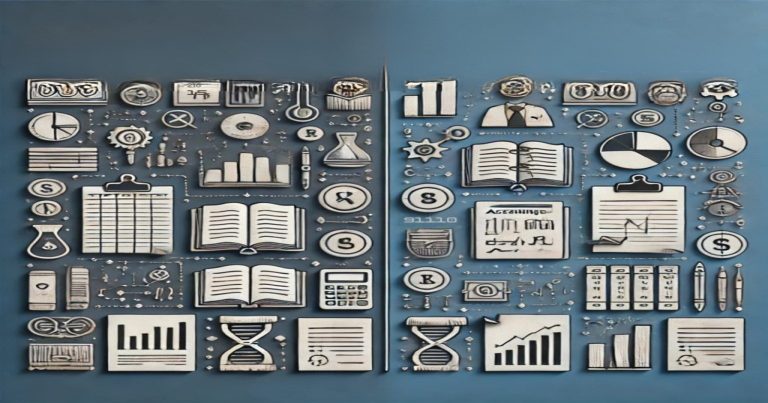Many people confuse bookkeeping with accounting when managing finances. There is a clear line dividing bookkeeping and accounting. Bookkeeping is the process of recording financial transactions. Accounting also consists of interpreting, summarizing, and reporting transactions to facilitate informed decisions about businesses. The difference between bookkeeping and accounting is in the function and scope of the two. Bookkeepers are responsible for maintaining precise records of all financial activities taking place. Accountants take bookkeeping records and develop reports from them. Then they are supposed to analyze them in terms of financial performance and offer their guidance. Both have unique purposes, which are towards the financial management of the business.
What is Bookkeeping?
The term bookkeeping refers to the systematic, regular recordkeeping of all monetary transactions occurring within the entity. Valued as an important activity, bookkeeping helps keep track of money coming in and out. It is the responsibility of the bookkeeper to ensure that every financial transaction is accurately recorded. Thus, it gives credence to the maintenance of an accurate picture of the business’s financial activity.
Simplicity is the nature of bookkeeping-organizing and maintaining records for financial activity. This encompasses records of buying and selling, receipts, and payments. Whether in the form of exchange or use of promotional material, a bookkeeper must keep these records current so that the information can be used down the line for financial analysis.
Key Activities of Bookkeeping
- Recording Transactions: Bookkeepers record all financial transactions. This includes sales, purchases, and payments.
- Managing Accounts Payable and Receivable: The bookkeeper keeps track of what a business owes suppliers and what customers owe the business (accounts receivable).
- Reconciling Bank Statements: The bookkeeper ensures that the bank statement of the company is in agreement with the financial records. For that, any discrepancies are being sourced and identified.
- Preparation of Financial Statements: The bookkeeper prepares simple financial statements, such as balance sheets and income statements, for internal use.
By keeping accurate, up-to-date records, the bookkeeper ensures the foundation for the accounting work is laid. But accounting, in itself, is only an art—and a mechanical one at that. It is all concerned with recording the happenings; analysis and decision-making do not come in.
What is Accounting?
One would define accounting as the systematic summarization, analysis, and reporting of financial transactions. Accounting, therefore, has a wider horizon compared to bookkeeping. It requires analysis of financial information, detailed report writing, and professional opinions from accountants that become handy for the owners in making strategic decisions. Accounting enjoys a wider role than just the keeping of financial records. It involves financial performance projections, taxation, and compliance.
Interpretation of financial data provides actionable insights. These, in turn, help businesses understand their financial health. The accountants work from the information provided by the bookkeepers. After analyzing it, they create reports to show the financial position of the business.
What Does the Accounting Function Involve?
- Financial Reporting: It entails accountants drafting comprehensive financial reports, including profit and loss accounts, balance sheets, and cash flow statements.
- Tax preparation: It is for accountants, ensuring compliance by all businesses. This gives backing to their preparation of tax returns.
- Budgeting and forecasting: Accounting includes the future planning of the company through formulating budgets and preparing cash flow forecasts.
Accountants provide advisory services to the firm on improving financial performance and cost management. Transactions are recorded under bookkeeping. Accounting takes those records and analyzes them for reporting purposes on the business’s financial performance.
Difference Between Bookkeeping and Accounting
Essentially, both bookkeeping and accounting are integral to financial control; however, they satisfy contrasting objectives. The following table lists the differences between bookkeeping and accounting:
| Aspect | Bookkeeping | Accounting |
| Objective | Recording the Financial Transaction | Analyzing and interpreting the financials |
| Level of Complexity | Simple, Routine | Complex Analysis and Strategic Decision |
| Time Frame | Ongoing Entry on a Daily Basis | Reporting monthly, quarterly, or yearly |
| Main Purpose | Maintain Accurate Financial Records | Provide Financial Interpretations and Reports |
| Function | Keeps Track of Every Transaction | Prepares Reports and Provides Financial Consultancy |
| Who Performs It | Bookkeeper | Accountant |
Understanding differences:
- Scope: Perhaps the main distinction between bookkeeping and accounting clearly lies in scope. Bookkeeping is concerned with the daily matters of recording transactions. Accounting assesses these transactions so that they can be reported on and commented upon.
- Complexity: Bookkeeping is quite simple. It involves everyday activities. Accounting helps unravel patterns in finance. It requires knowledge beyond bookkeeping. It produces reports and gives advice.
- Decision-Making: Accounting supports decision-making in an organization; for example, strategic paths forward are decided based on financial data. On the contrary, bookkeeping does not keep track of any insights or recommendations; it is merely concerned with keeping the records right.
- Time Frame: Bookkeeping is continuous and carried out day by day. Accounting is done at intervals, such as by the end of a month, a quarter, or a year, studying and reporting on the financial performance.
- Function: Bookkeeping is the upkeep of an account of every single transaction; accounting examines that account with regard to the assessment of the business’s performance. We should stress the advisory role: any good accounting firm will forward its views on strategic decisions concerning the financing of the firm.
Why Do We Need to Recognise Distinction?
There are several reasons to understand the difference between bookkeeping and accounting:
- It helps manage finances: Knowing who does what makes it easier to manage finances. Bookkeepers keep records, while accountants use them to make strategic decisions.
- Accurate Financial Reporting: Bookkeeping serves as the base for accurate financial reporting. The figures from these books are then used by accountants to craft a detailed report.
- Tax and legal compliance: Both bookkeeping and accounting are very necessary. It is very important to ensure the compliance of the business with tax laws and regulations. “Bookkeeping is capturing all the financial transactions; accrual accounting involves ensuring that all taxes are calculated and paid.”
- Better Business Decision Making: Accountants help bring sound decisions to the table for the business. Interpreting the relevant data, bookkeepers ensure that the figures are accurate.
In brief, differential understanding is just as worthy for businesses. This, in reality, divides the resources efficiently and brings better financial decisions.
Difference Between Bookkeeping and Accounting FAQs
1. Distinction between bookkeeping and accounting?
While bookkeeping concerns itself with the recording of financial transactions, accounting pertains to interpreting, classifying, and summarizing financial information for reporting purposes.
2. What distinguishes a bookkeeper from an accountant?
A bookkeeper records all transactions that are involved in daily financial activities, whereas an accountant analyses and interprets those records to come up with financial statements and reports.
3. Give an example of bookkeeping and accounting.
Bookkeeping example: Recording daily sales transactions; Accounting example: Preparing financial statements based on the already recorded statements.
4. What is bookkeeping and accountancy in class 11?
In class 11, bookkeeping is a term used for the maintenance of financial transactions, and accountancy is the methodology of summarizing, analyzing and reporting financial data.
5. Who is called the father of accounting?
Luca Pacioli Italian mathematician who conceived the double-entry bookkeeping method-bestows on him the father of modern accounting.


